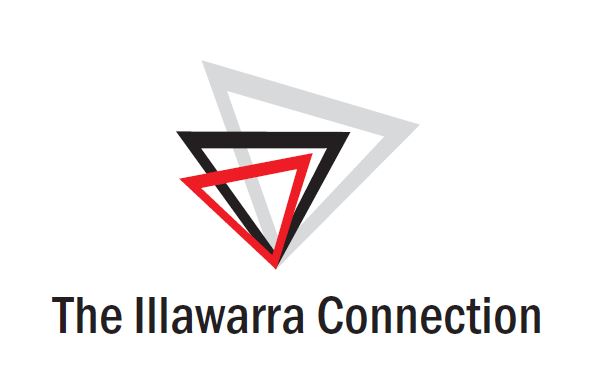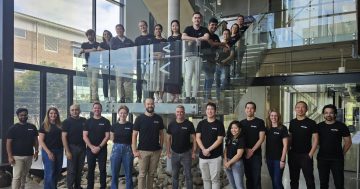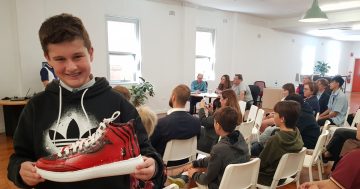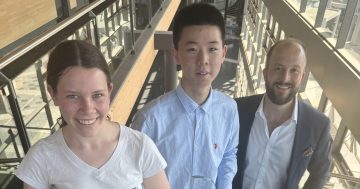Sicona Battery Technologies co-founder and chief technical officer Dr Andrew Minett celebrating being named a finalist in three 2023 IMB Illawarra Business Awards categories on 30 August. Photo: Supplied.
A need for the world to fast-track electrification and move away from fossil fuels is what has Dr Andrew (Drew) Minett charged up to drive change through Wollongong startup Sicona Battery Technologies.
And Drew is a perfect fit to help steer that change, after studying a PhD in materials chemistry, securing fellowships to study and teach abroad, and having supported many startups.
Now he is co-founder and chief technical officer at Sicona, producing battery materials technology used in lithium-ion batteries for electric mobility and storage of renewable energy.
It’s a business that was named a finalist in three categories of Business Illawarra’s 2023 IMB Illawarra Business Awards – International Business, Excellence in Tech, and Excellence in Innovation.
It’s what’s also made Drew worthy of delivering the prestigious Hargrave Lecture at The Illawarra Connection on 10 October, titled ‘Energising the Illawarra’s Future’.
The materials scientist and device engineer graduated from university with a PhD in materials chemistry and went on to secure several fellowships internationally.
“All those were overseas and so it gave an understanding of the world outside of the escarpment,” he said.
“I went from a chemistry PhD to a postdoc in solid state physics with a Nobel Prize winner.
“Then to the oldest university in Ireland, one of the premier universities in the US and then eventually, because of the knowledge and experience I gained in Europe, I was successful in getting a prestigious research fellowship back in Australia – ARC QEII Fellowship – which brought me back to Wollongong.”
Drew’s academic career finally ended as a professor of chemical engineering at the University of Sydney.
His students dubbed him “the most non-academic academic at the university” because of his experiences outside of normalised academia and his entrepreneurial tendencies.
“I always pushed that through my lectures and teachings with all of my students, so they’re the ones that gave me this moniker,” he said.
“Because I wasn’t this traditional materials chemist, chemical engineer or physicist, I brought all my experiences together and I was sort of a unique beast.
“I ended up with more consulting work and roles in startups while I was in academia and then it just became a natural progression.”
That progression saw him provide advisory services to ASX-listed businesses through to early startups.
“Then Sicona came along – right opportunity at the right time,” he said.
“The driving force of what gets me out of bed and brings me to work every day is this belief the world needs to fast-track electrification and move away from fossil fuels as fast as possible.”
The company has seen rapid growth since launching during COVID-19, but the journey hasn’t been an easy one.
It was started as an idea by co-founder and CEO Christiaan Jordan to move into something beyond graphite as silicon anodes were slated as the “next big thing”. Christiaan realised he needed a technical expert, and contacted one of Drew’s colleagues, coincidentally named Andrew.
“They had a conversation and Andrew said to Christiaan, ‘Yes, love the idea, but you’re talking to the wrong Andrew’,” he said.
Once connected, Christiaan revealed that the intellectual property (IP) for the project was at UOW.
“I thought, well, that’s funny because that was my alma mater,” he said. “That was a very funny coincidence that out of everywhere around the world, it came from my alma mater, and hence why Sicona itself was born in Wollongong.”
When it comes to explaining what Sicona now does, his background in simplifying complex information is evident.
“Sicona is a midstream materials manufacturing company that makes materials that if you pixie dust them into current lithium-ion rechargeable batteries, you end up with up to 50 per cent more energy density in that battery or in that cell,” he said.
“What that means is when you take those cells in an electric vehicle for example, the same cells and the same chemistry but with our pixie dust, your Tesla Model Y will have up to 50 per cent further range.
“The other part of it is that the pixie dust that we add allows for fast charging, and so you can recharge your battery in under 15 minutes.
“So you get a triple whammy – you get further range, you’re able to charge it faster and we can actually drop the cost of the battery pack of a Model Y somewhere between $5000 and $10,000 which is substantial.”
While their materials can go into any lithium-ion battery – from watches to laptops – the biggest market and their focus is electric vehicles.
“What we can provide at the dollar cost value of unit energy stored for electric vehicles is substantial and, therefore, they are coming to us rather than us going out and waving our arms,” he said.
Having been in stealth mode for three years, he said strong national and international media attention had now shifted them out of that.
“We want to be the globally dominant silicon carbon company in the world,” he said. “We want to be the largest producer of our particular pixie dust in the world by 2030.”
It’s a far cry from trying to manage the business through COVID-19.
During that time, one of their investor rounds was done completely via Zoom, they built a pilot plant in Wollongong during lockdowns, and grew their IP portfolio from that one UOW patent to now having 126 patents.
“With growth and expansion of the company, I was employee number one, and we’re now at 28 today,” he said.
He said the immediate next goal was validation and offtake from a global EV manufacturer or cell manufacturer.
“The Teslas and the BYDs and the Volkswagens of the world that are focused on EVs, or your Panasonic, Samsung, LG cell manufacturers, we will potentially sell our materials to either class of customer – either the ones that are making the individual cells or the end users of those cells,” he said.
“So it’s getting through the validation process with those customers.”












